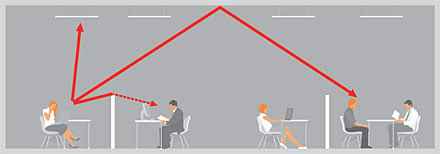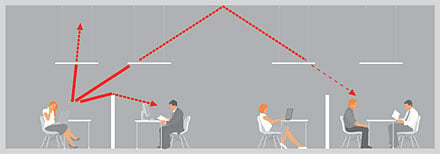Acoustic islands

The use of free-hanging panels as acoustic rafts, or acoustic islands, provides flexibility and a multitude of acoustic solutions to problems related to acoustic design. Where free-hanging acoustic units are used to improve poor acoustics, solitary units give the benefit of diffraction, with a larger area of the absorbing acoustic raft being exposed to the sound field. Both effects can be used to increase sound absorbing properties.
In large, noisy environments such as open-plan areas, restaurants, shopping centres etc., free-hanging rafts can be installed close to working areas or other locations where acoustic treatment is needed in order to achieve suitable conditions for communication, concentration or recovery. Acoustic rafts are suitable in, for instance, reception and information counters, refreshment areas, or included in larger, noisy spaces.
In premises where, for various reasons, an overall ceiling cannot be used, e.g. where temperature is regulated via the joists (concrete core activation) or where there are large areas of glass, absorbent rafts are one way of creating acceptable acoustic environments. The absorbent islands can be designed as baffles or horizontally suspended units.
Sound absorbing acoustic rafts can also be used in environments where sound absorbing ceilings do not provide sufficient absorption. By supplementing with suspended horizontal absorbers or baffles, the acoustic environment can be improved with a reduction of the sound level and sound propagation.
Acoustic effect around a free-hanging unit
-
Noise reduction in the vicinity of Free-hanging acoustic rafts
-
Increased speech intelligibility and C50
-
Shorter early decay time (EDT)
-
Increased directional hearing
In open-plan spaces, free-hanging units can be used as a complement to wall-to-wall acoustic ceilings. Installing acoustic rafts above workplaces will, in addition to the effects listed above, reduce sound propagation across large distances and contribute to increased privacy between working groups
Subjective effects of free-hanging units
-
Increased speech and listening comfort
-
Reduced stress and stress-related symptoms
-
Less vocal effort
-
Easier to concentrate
In cases where the free-hanging units are used as solitary rafts above workplaces, the absorbers should be installed as close to the workplace as possible, thus increasing the shielding effect. The free-hanging acoustic units should cover the working area, preferably with a slight overlap.
High installation

Low installation

When using free-hanging units as a complement to wall-to-wall acoustic ceiling, it is often better to split the free-hanging units into smaller groups and distribute these over the total ceiling area than to use larger free-hanging acoustic rafts irregularly over the ceiling. Division into smaller clusters will enhance the diffraction effect and contribute to a more diffuse sound field.
If a workplace is near reflecting walls, the recommendation is to use wall absorbers as a complement to the free-hanging units.
Free-hanging units increase the ability to localise sound sources in the vicinity of a workplace. This will increase the sensation of control and create a less stress-induced environment.
